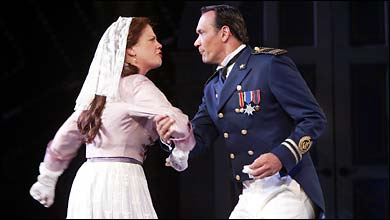|
 |
|
Esta página no está disponible en español. The New York Times Sparks are Flying with Beatrice and Benedick in Central Park by NEIL GENZLINGER July 14, 2004
There will be a juicy battle going on nightly at the Delacorte Theater in Central Park, where "Much Ado About Nothing" is this year's Shakespeare in the Park offering from the Public Theater. It's not the insult-a-thon between Beatrice and Benedick, though that remains as lively as when Shakespeare conceived it four centuries ago. The main event here is the wonderful war between Kristen Johnston and Jimmy Smits, who play those characters, as they vie for the title of crowd favorite. The surprise winner is Mr. Smits. Who knew he had perfect comic timing? Ms. Johnston's credentials in that department are well known from her years on the nutty sitcom "Third Rock From the Sun," and they are put to great use in the play, which was scheduled to open last night. But Mr. Smits is her match and more. Both play the humor of Shakespeare's inconsequential story with a relaxed ease that challenges the audience to keep up while at the same time making that easy to do. And when they are onstage together, the summer sun setting and the sparks flying, it is sublime fun indeed. David Esbjornson, who directs, has done everyone a favor by taking a relatively straightforward approach, letting the tale of love, treachery and more love roll along largely unimpeded. Oh, there are a few revisionist touches, beginning with the setting, which seems to be early 20th century, with guns and a gramophone and allusions to Italian Futurism in evidence. But the gimmickry doesn't intrude much — a cheesy sight gag involving a motorscooter is the worst offender — or overshadow the words and the actors delivering them. It even seems, early on, that Mr. Esbjornson's approach may be a little too straightforward, earning the dreaded "competent" tag rather than a more exciting adjective. But then comes the scene in which Benedick, the avowed bachelor, is tricked by his friends into falling in love with Beatrice, his man-hating nemesis. Mr. Esbjornson assigns Mr. Smits some dandy physical comedy, which he executes with a crowd-pleasing fearlessness. When, at the scene's conclusion, he exclaims, "The world must be peopled!," he might bring the house down were this not an open-air theater. Ms. Johnston isn't allowed to get quite as ridiculous when it comes time for Beatrice to be tricked, but she makes the most of her comic moments throughout the evening and shows an impressive mastery of Shakespeare's prose. Both she and Mr. Smits also show a great restraint, playing to the audience with subtlety rather than the lowest-common-denominator overkill seen so often in the comedy of the small screen, where the two became famous. The other star attraction is the pairing of Sam Waterston and his daughter, Elisabeth Waterston, as the story's father and daughter, Leonato and Hero. This ends up being not nearly as cloying or annoying as it might have been. Partly that is because Hero, the beautiful maiden at the center of the tale, doesn't really have much to do other than smile. And partly it's because during Mr. Waterston's long, raspy rant in the second act, when he falsely thinks his daughter is a tramp, the main distraction is not that he's talking about his real-life daughter; it's that it looks as if he might explode or spontaneously combust at any moment in the summer heat. Mr. Waterston seems a bit out of place stylistically, but most of the other major players are nice fits. Peter Francis James as Don Pedro, the prince whose arrival at Leonato's home sets everything in motion, is an assured presence, and Christopher Evan Welch as his rotten brother, Don John, gives the rogue's role a compelling spin. Dominic Chianese, a "Sopranos" cast member, has fine moments as Antonio, Leonato's brother. Lorenzo Pisoni makes a fairly generic Claudio, Hero's suitor, but it's just as well, because Beatrice and Benedick are the couple of interest. After the intermission Mr. Esbjornson comes close to squandering the audience's good will with a plodding opening to the second half of the proceedings, heralded by the arrival of Dogberry, normally one of the funniest characters in Shakespeare's arsenal. Brian Murray, in that role, drops a thudding plate of community-theater ham into Mr. Esbjornson's otherwise sophisticated banquet, getting a few sympathy laughs but destroying the show's generally zippy pacing. Fortunately Dogberry, like the motorscooter, isn't around long, and by the play's end everything is forgiven. All in all it's a production that is perhaps close to Joseph Papp's original intent for the park performances: Shakespeare that is neither dumbed down for the masses nor high-concept experiment; actors and audience in sync, relishing the writer and the summer air. MUCH ADO ABOUT NOTHING By William Shakespeare; directed by David Esbjornson; sets by Christine Jones; costumes by Jess Goldstein; lights Michael Chybowski; music composition and coordination by Mark Bennett; sound by Acme Sound Partners; choreography by Jane Comfort; wigs by Charles Lapointe; production stage manager, Charles Means; assistant stage manager, Elizabeth Moloney; managing director, Michael Hurst. Presented by the Public Theater; producer, George C. Wolfe; executive director, Mara Manus. Delacorte Theater, Central Park. Entrances at West 81st Street and Central Park West and 79th Street at Fifth Avenue, Manhattan. WITH: Jimmy Smits (Benedick), Kristen Johnston (Beatrice), Sam Waterston (Leonato), Elisabeth Waterston (Hero), Peter Francis James (Don Pedro), Lorenzo Pisoni (Claudio), Dominic Chianese (Antonio), Julio Monge (Conrad), Christopher Evan Welch (Don John), Sean Patrick Thomas (Borachio), Laura Kaichen (Margaret), Jayne Houdyshell (Ursula) and Brian Murray (Dogberry).
|

 PHOTO: Sara Krulwich/The New York Times
PHOTO: Sara Krulwich/The New York Times